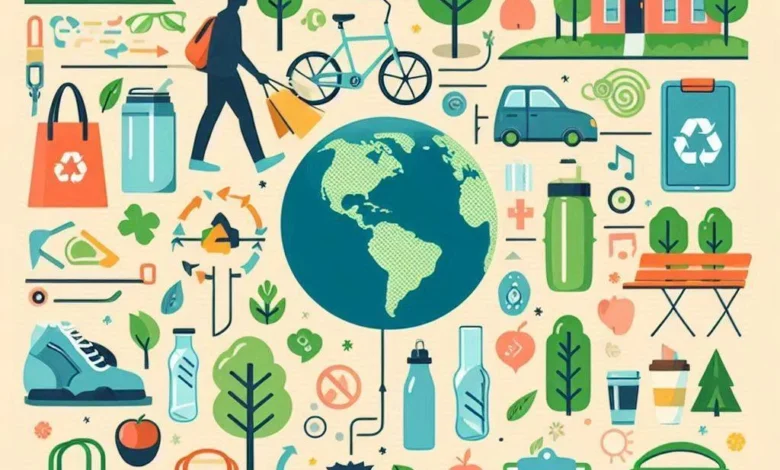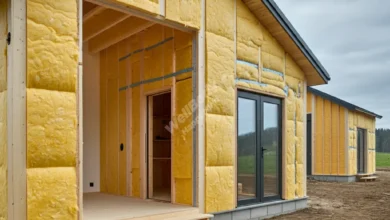Low Carbon Lifestyle: Small Changes for a Significant Impact

Have you ever wondered how your daily choices affect the planet? Picture this: every time you flip a switch, drive your car, or buy groceries, you’re leaving a mark on the environment. This mark is your carbon footprint, and it’s more significant than you might think.
In today’s world, where climate change is a pressing concern, adopting a low carbon lifestyle isn’t just a trend—it’s a necessity. But here’s the good news: you don’t need to overhaul your entire life overnight. Small, consistent changes can lead to a big impact on reducing your carbon footprint and helping the environment.
Let’s explore how you can make these changes and why they matter so much.
Understanding Your Carbon Footprint
What’s a Carbon Footprint?
Your carbon footprint is the total amount of greenhouse gases produced by your actions. Think of it as your personal impact on climate change. The bigger your footprint, the more you’re contributing to global warming.
Main Contributors to Your Carbon Footprint
Your carbon footprint comes from many sources, but these are the big ones:
- Transportation: How you get around
- Energy consumption: The power you use at home and work
- Food choices: What you eat and where it comes from
- Consumer habits: What you buy and how often
Measuring Your Impact
Curious about your carbon footprint? Several online tools can help you calculate it. Popular options include:
- The Nature Conservancy Carbon Footprint Calculator
- WWF Footprint Calculator
- EPA Carbon Footprint Calculator
These tools ask questions about your lifestyle and give you an estimate of your carbon footprint. It’s a great first step in understanding your impact.
Home Energy Efficiency
Why Home Energy Matters
Your home is like a mini-power plant. Every light you turn on, every device you charge, and every degree you adjust your thermostat contributes to your carbon footprint. But here’s the good news: small changes at home can lead to big energy savings.
Simple Energy-Saving Tips
You can start reducing your energy use today with these easy steps:
- Switch to LED bulbs: They use up to 75% less energy than traditional bulbs
- Unplug electronics: Even when turned off, many devices still draw power
- Adjust your thermostat: Lower it in winter and raise it in summer by just a few degrees
Long-Term Energy Efficiency
For bigger impact, consider these home improvements:
Insulation is key to keeping your home comfortable without overworking your heating and cooling systems. Energy-efficient appliances can significantly cut your power use. And smart home systems allow you to control and optimize your energy use with precision.
These changes might require some upfront investment, but they pay off in lower energy bills and a reduced carbon footprint over time.
Sustainable Transportation Choices
The Road to Lower Emissions
Did you know that transportation is one of the biggest contributors to your carbon footprint? Every time you start your car, you’re releasing greenhouse gases into the atmosphere. But don’t worry – there are plenty of ways to get around that are kinder to our planet.
Eco-Friendly Ways to Travel
Consider these greener alternatives for your daily commute or errands:
- Walking: Great for short distances and your health
- Cycling: Faster than walking and still zero emissions
- Public transit: Let someone else do the driving while reducing per-person emissions
- Carpooling: Share the ride and the carbon footprint
Driving Greener
When you do need to drive, try these tips to reduce your car’s emissions:
- Keep up with regular maintenance for better fuel efficiency
- Avoid idling – turn off the engine if you’re waiting more than 10 seconds
- Combine trips to reduce overall driving time
Remember, every mile not driven in a gas-powered car is a win for the environment!
Eco-Friendly Food Choices
You Are What You Eat (And So Is Your Carbon Footprint)
Your diet doesn’t just affect your health – it impacts the planet too. The food on your plate has traveled a long way, and its journey contributes to your carbon footprint.
Low Carbon Food Options
Some foods have a much lower carbon footprint than others. Here’s a quick comparison:
| Food Item | Carbon Footprint (kg CO2e per kg) |
|---|---|
| Beef | 60 |
| Cheese | 21 |
| Eggs | 4.8 |
| Tofu | 2 |
| Lentils | 0.9 |
As you can see, plant-based proteins like lentils and tofu have a much lower impact than animal products.
Reducing Food Waste
Did you know that food waste is a major contributor to greenhouse gas emissions? Here’s how you can help:
- Plan your meals: This reduces overbuying and spoilage
- Start composting: Turn food scraps into nutrient-rich soil
- Store food properly: Learn the best ways to keep your food fresh longer
By making smart choices about what you eat and how you handle food waste, you can take a big bite out of your carbon footprint!
Mindful Consumption Habits
Shop Smart, Live Green
Every purchase you make has an environmental cost. From production to packaging to transportation, the things we buy contribute to our carbon footprint. But don’t worry – you don’t have to give up shopping entirely. The key is to become a mindful consumer.
The Three R’s: Reduce, Reuse, Recycle
You’ve probably heard this mantra before, but let’s break it down:
- Reduce: The best way to lower your impact is to buy less. Before purchasing, ask yourself: “Do I really need this?”
- Reuse: Get creative! Can you repurpose items you already have? For example, use glass jars for storage or turn old t-shirts into cleaning rags.
- Recycle: When you can’t reduce or reuse, make sure to recycle properly. Learn your local recycling guidelines to ensure your efforts aren’t wasted.
Choosing Eco-Friendly Products
When you do need to buy something new, look for these eco-friendly features:
- Certifications like Energy Star, USDA Organic, or Fair Trade
- Minimal packaging or packaging made from recycled materials
- Locally produced items to reduce transportation emissions
Remember, every purchase is a vote for the kind of world you want to live in. Choose wisely!
Green Leisure and Travel
Fun Doesn’t Have to Cost the Earth
Entertainment and travel can be major contributors to your carbon footprint, but they don’t have to be. Let’s explore some low-carbon ways to have fun and see the world.
Low Carbon Entertainment Options
Here are some eco-friendly ways to enjoy your free time:
- Get outdoors: Go for a hike, have a picnic, or stargaze – nature’s entertainment is carbon-free!
- Explore locally: Be a tourist in your own town. You might be surprised by what you discover.
- Virtual experiences: From museum tours to concerts, many experiences are available online, saving travel emissions.
Tips for Eco-Friendly Travel
When you do venture further afield, keep these tips in mind:
- Choose sustainable accommodations: Look for hotels with green certifications or consider eco-lodges.
- Offset your travel emissions: Many airlines offer carbon offset programs for your flights.
- Pack light: The less weight on a plane, the less fuel it uses.
- Use public transportation at your destination: It’s often cheaper and more eco-friendly than renting a car.
Remember, sustainable travel isn’t about never going anywhere. It’s about making smart choices that reduce your impact while still allowing you to explore and enjoy the world.
By being mindful about your consumption and leisure activities, you can significantly reduce your carbon footprint without sacrificing fun or adventure. Every small choice adds up to a big difference for our planet!
Community Engagement and Advocacy
Together, We’re Stronger
While individual actions are crucial, collective effort can create an even bigger impact. By engaging with your community and advocating for change, you can amplify your positive influence on the environment.
Get Involved Locally
Here are some ways to make a difference in your community:
- Join local environmental groups
- Participate in community clean-up events
- Support green policies in your area
- Start or join a community garden
Spread the Word
One of the most powerful things you can do is share your knowledge with others. Here’s how:
- Talk to friends and family about your low-carbon lifestyle
- Share tips and experiences on social media
- Lead by example in your daily life
Remember, every conversation is an opportunity to inspire change!
Measuring Your Progress
Track Your Impact
As you make changes in your life, it’s important to measure your progress. This helps you stay motivated and identifies areas where you can improve further.
Ways to Monitor Your Carbon Footprint
Keep track of your impact with these methods:
- Regularly recalculate your carbon footprint using online tools
- Keep an eco-journal to record your daily habits and changes
- Monitor your energy bills for reductions in usage
Celebrate Your Wins
Don’t forget to acknowledge your progress, no matter how small:
- Set achievable goals and reward yourself when you reach them
- Share your successes with friends and family
- Use your achievements as motivation to set new, more ambitious goals
Remember, every step forward, no matter how small, is a win for the planet!
Conclusion
Small Changes, Big Impact
As we’ve explored throughout this article, adopting a low carbon lifestyle doesn’t require a complete overhaul of your life. It’s about making conscious choices in your daily routines that add up to significant change.
Let’s recap some key points:
- Understand your carbon footprint
- Improve your home’s energy efficiency
- Choose sustainable transportation options
- Make eco-friendly food choices
- Practice mindful consumption
- Enjoy green leisure and travel
- Engage with your community
- Track your progress and celebrate wins
Remember, the journey to a low carbon lifestyle is ongoing. Each day presents new opportunities to make choices that benefit both you and the planet.
Your Next Steps
Now that you’re armed with knowledge and practical tips, it’s time to take action. Start with one small change today. Maybe it’s switching to LED bulbs, or choosing to walk instead of drive for short trips. Whatever you choose, know that you’re making a difference.
As you continue on your low carbon journey, keep learning, stay motivated, and inspire others along the way. Together, we can create a more sustainable future, one small change at a time.



